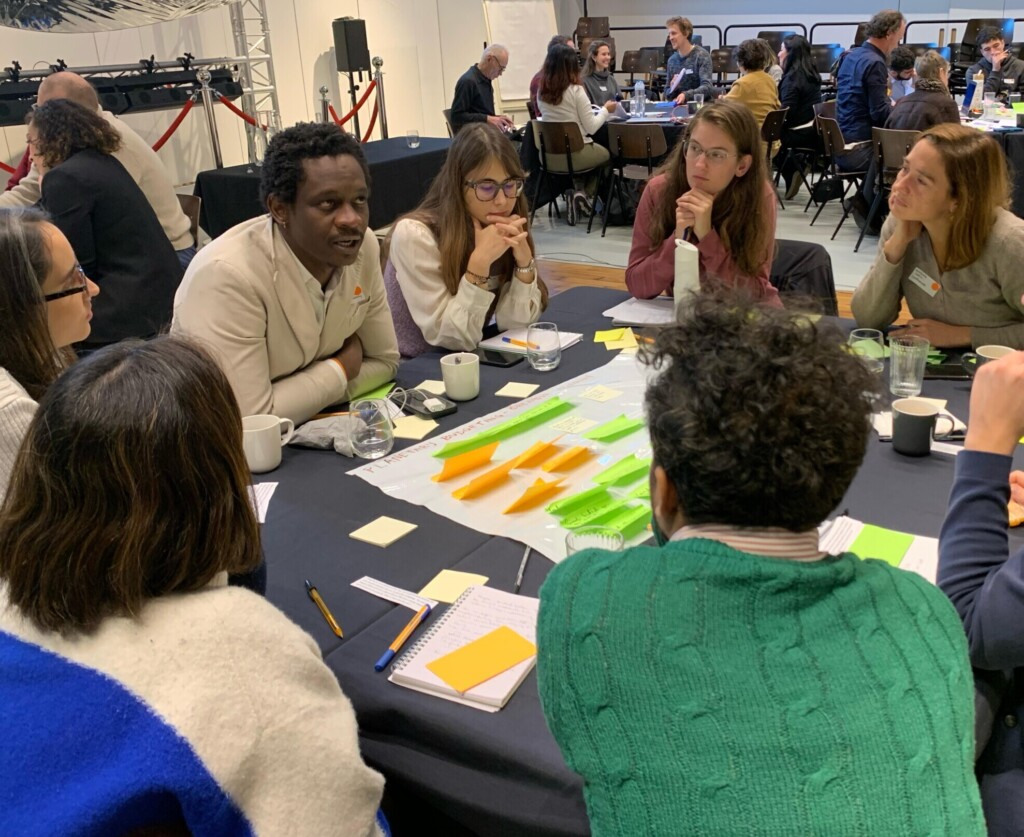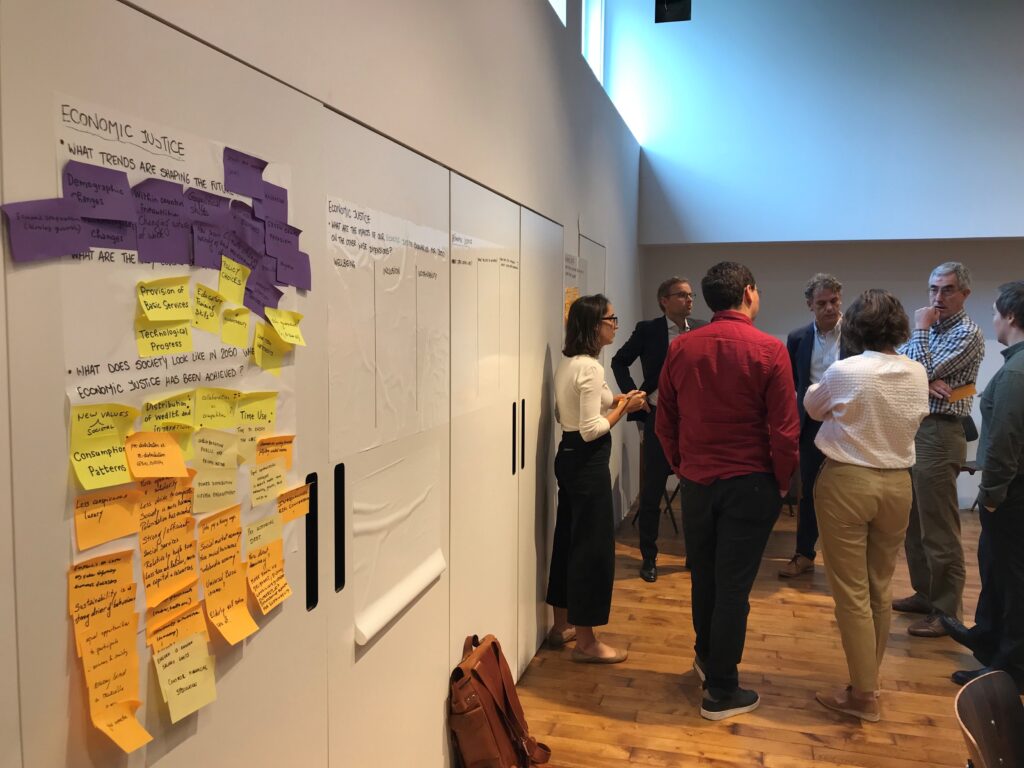Exploring Future Possibilities through co-creation
Outcomes and Learnings from the WISE Horizons Labs
How would a future where wellbeing, inclusion and sustainability are a reality look like and what driving factors will shape our journey towards it? If we were to model a just transition, how might time allocation, climate risks management, or welfare system structures change the future outcome? How do global dynamics influence our perception of wellbeing, inclusion, and sustainability? What are the differences and connections between the “Global North” and “Global South” regarding these concepts?
The WISE Horizons project team has spent the last months exploring these deep, complex questions. As part of this investigative process, we hosted three workshops between 2023 and 2024: the Future , the Just Transition and The Global South Insights labs, in which we used co-creation tools to ensure inclusion, foster innovation, and promote ownership.
The Future Lab
The Future Lab (September 2023, Brussels) convened 23 participants from academia, civil society, business and policymaking from 13 different countries of origin to develop a series of qualitative scenarios for 2050 using scenario planning as an approach. This modern strategic management tool, distinct from forecasting, helps to anticipate and prepare for different future outcomes. The scenarios the participants looked at focused on four key dimensions: Wellbeing, Inclusion, Sustainability, and Economic Justice. We also invited participants to identify the most important driving factors of different, possible future states in 2050.
The structure of the Future Lab
The Just Transitions Lab
Two months later, the Just Transitions Lab (November 2023, Brussels) convened 25 participants from 18 countries with the goal of capturing the insights of different stakeholders, representing a wide range of groups that have been historically marginalised from decision-making and adversely affected by policies and phenomena related to the green transition. In groups, they collectively articulated the key trade-offs that inevitably may emerge / must be acknowledged when implementing policies and actions needed for a better future. Through diverse co-creative activities, we aimed to ensure that the modelling exercises being done as part of WISE Horizons technical work is informed by these perspectives.
The Global South Insights Lab
The Global South Insights Lab amplified voices from regions outside Europe, particularly the Southern Hemisphere. The lab convened participants and consortium members from diverse global regions, including Africa, Latin America, and Asia, representing NGOs, academia, international organiszations, and policymaking. The event contributed to research outputs like the Theory of Institutional Change (ToIC) and the upcoming WISE Global Report. Participants reviewed conclusions from earlier labs, identifying commonalities, discrepancies, and evaluating model applicability across diverse settings. The lab sought to ensure these initiatives transcend Western-centric views and effectively address diverse global priorities.
Envisioning tomorrow together: The power of co-creation
As the Future Lab employed co-creative scenario planning, this meant that multiple stakeholders could be actively involved in developing and exploring different scenarios. Having policymakers, researchers, civil society, and business owners partake in a collective visioning exercise led to a highly diverse range of scenarios that could be developed. With several driving forces and uncertainties arising from the discussion, the WISE Horizons team had a more comprehensive and nuanced set of scenarios off which to base the models, while participants left with a feeling of ownership and commitment to the scenarios and resulting models they were helping to shape. From a research perspective, this methodology not only enhances models’ robustness due to the testing of assumptions but also renders them more connected and relevant to people lived experience.
Collaborative modelling, another innovative method that inspired the activities of the second in-person event, the Just Transition Lab, enabled technical experts to consult with community members and cross-disciplinary stakeholders. This way, the group could harness collective knowledge, draw from several areas of expertise, and devise solutions together as well as pinpoint conflicts. The key benefits of co-creation end up being enhanced transparency, higher community engagement, and relevant to contexts so that different parties’ needs are more likely met through the outcomes.
For instance, WISE Horizons technical expert at Leiden University, Inge Schrijver, who sought feedback from participants whilst developing her model on planetary budgets, commented:

“The most important take-away for me is to keep seeing and making the connection between the technical work (planetary budgets) and broader issues of for instance governance and power in international systems. It will not be easy or perhaps possible to incorporate these kinds of things properly into the model itself, but it should play a role in the report about the model.“
Inge Schrijver receiving input from a diverse, multi-disciplinary group of participants on her planetary budgeting model at the Just Transition Lab
Co-creation in virtual space
In the Global South Insights Lab, we fostered co-creation through various digital platforms. To overcome the constraints of online events, we worked collaboratively in both small and large groups. Following a brief presentation in a plenary session covering the WISE Theoretical Framework and its Theory of Institutional Change, we engaged in a more in-depth discussion with the Lab participants in break-out groups. Having both small and large groups gave rise to diverse perspectives, encouraging active participation, and ensuring comprehensive discussions.
Main Takeaways from the WISE Horizons Labs:
Although participants contributed a wealth of information based on their expertise and everyday experience in different contexts, a few core ideas were captured.
At the Future Lab, these high-level themes emerged:
- A synergetic future composed of several WISE dimensions being achieved is possible.
- As is often the case with policy implementation, tensions and trade-offs may stand in the way.
- Zooming in and out is essential to capture global perspectives of policy interventions, particularly for fair distribution. In short, history can be a good guide.
- Justice is a key word, but not an easy one to define, as it demands a broader representative conversation with several stakeholders and is context-sensitive and scale-dependent.
- Education must shift toward to de-colonial worldviews to support diversity and plurality.
- New narratives underlie all scenarios in a way that reflect our changing values and needs, especially the change from individually focused action to collective future-shaping.
- The question remains who gets to decide on the narrative, especially when the process is democratic via citizen assemblies, democracy at work, and other spaces of exchange.
- Being in an emergency means that we must work on multiple fronts to deal with complex, systemic problems immediately facing us. Preparing entails understanding trends and impacts of climate and environmental change on our social structures.
At the Just Transition Lab, these findings speak to modeling more broadly:
- A global approach toward a just transition should be applied, while still informed by local needs. While inspired by pluriverse thinking, applying a global approach to economic re-structuring might be needed. Within the discussion of modelling planetary budgets, while the system might be dictated globally, taking bioregional needs into account is essential. Furthermore, we must measure and/or capture needs at a local level and link them with the bigger picture.
- One cannot underestimate the role of power structures on the just transition. Power structures are at times challenging to model (i.e. financial systems and countries or institutions wielding power) and might even be shaped by a modeler’s own biases. Values embedded in the WISE Horizons models may contribute to demonstrate how power structures could be overcome.
- A sense of agency dictates how individuals and groups can influence approaches and policies for a just transition taken around welfare, productivity, time-use and planetary budgets. Many decisions around these topics depends on how much an individual or group feels they have a choice in the matter.
- Models across themes and scenarios are often interlinked and could be connected. For instance, time-use scenarios can be compared with scenarios for welfare, as the provision of services can influence how time is allocated for wellbeing and environmental impact. It might prove useful to connect to the broader debate around these topics rather than look at them independently.
At the Global South Insights Lab, these additional reflections emerge:
- Recognise the importance of Indigenous wisdom, the legacy of colonialism and exploitation. Emphasis
ze the shift towards a more human-centred approach that respects diverse cultural perspectives and integrates Indigenous knowledge into global decision-making.
- Highlight that qualitative data is essential alongside numerical figures. It provides nuanced insights into societal dynamics, cultural contexts, and lived experiences, ensuring more comprehensive decision-making.
- Reflect on the autonomy and sovereignty, which can improve countries’ agency, especially those in the Global South (the global majority).
- Prioritise gender equality as a crucial measure of progress. Integrating gender perspectives across all sectors promotes inclusive development and enhances societal resilience and sustainability.

Key takeaways across different models and group discussions are showcased for all participants to see at the Future Lab.